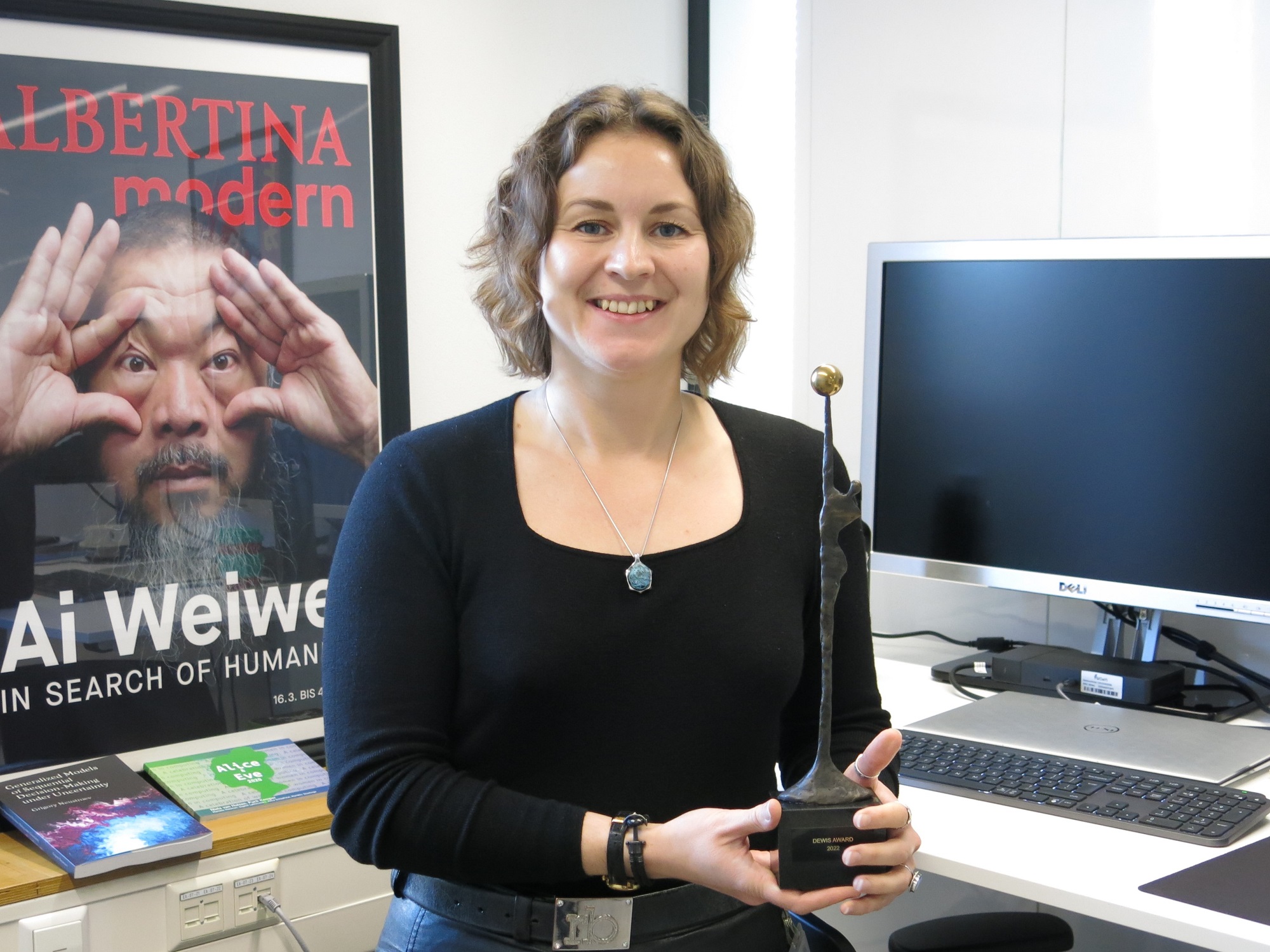Assistant Professor Anna Lukina received the 2022 DEWIS award for her mentorship programme to support female computer scientists.
Anna Lukina: “If there are more successful female+ professors around the world, there is a higher chance that some of them will be at TU Delft.” (Photo: Heather Montague)
English only
“I joined TU Delft as an Assistant Professor and Delft Technology Fellow in September 2021. In the Algorithmics group, I was given the freedom to develop my own master’s course and expand on my research vision. My aspiration is to design algorithms that we can trust. The digital revolution is here but we are not ready for it. I did my PhD in Vienna, the city of logic, and I see it as my responsibility to use maths and logic to guarantee that already deployed algorithms behave the way we expect.
My journey as a female in computer science started on the day I registered for an informatics competition hosted by Lomonosov Moscow State University without a clue what I was signing up for. I did study informatics at school but I had never solved algorithmic puzzles. I remember calling the Dean of Computer Science and asking if I should go for it. Looking back, I have no idea how as a high school student I got the Dean on the phone. I will never forget his response which was “any mind exercise is useful”. It was extremely scary and uncomfortable to go through the competition surrounded by all these boys who looked like they knew what they were doing. Failing all these interesting puzzle problems back then made me determined to enter this mysterious world of computer science.
In my last year at the university, there were at most 25% female students in our department of system analysis and only one female professor. As a female graduate in computer science, I did not feel confident to continue my career in the IT industry. After another degree in economics and four years in the financial industry my curiosity about computer science pushed me out of my comfort zone once again. LogiCS Doctoral College in Vienna attracted my attention because they advertised in bold red font that 30% of PhD vacancies were allocated to women. In the end, almost half of my PhD peers self-identified as female. The support and inspiration I received in this environment were instrumental in my career.
During my postdoc at the Institute of Science and Technology Austria, I had to establish my independent research line, gain visibility, and apply for faculty positions around the world. I had no time to waste and put myself under a lot of pressure. I knew how to achieve the first two objectives and had fantastic people to guide me, including my supervisor and senior colleagues. I had a very vague idea about the faculty application process and only knew a handful of female colleagues around the world who continued their academic careers. It was not until my first failed faculty interview, that I learned what it takes.
‘The lack of mentorship and the impact of having a mentor inspired me’
My failure turned into an opportunity when I met Arie van Deursen, Mathijs de Weerdt, and Matthijs Spaan who offered their mentorship. With their feedback, I developed the skills not typically taught to postdocs and became more confident in my success as future female faculty. Organising and participating in diversity events at the major conferences in artificial intelligence for several years, I saw the pattern in challenges that prominent female figures faced in their early careers. The lack of mentorship and the impact of having a mentor inspired my F+Cube concept as soon as I became the first female Faculty member in the Algorithmics group. I want to support self-identified female computer scientists internationally during that fragile period when they need to advance their academic career. I believe TU Delft has the means and the leadership to provide that support. I want future female+ faculty to feel supported the way I did when I started my PhD in Vienna.
The Delft Technology Fellowship is a great opportunity. In combination with F+Cube, we can create a better environment for everyone, even within just a few years. However, it takes the joint effort of every current faculty member at TU Delft to invest a few hours every year into scouting and mentoring young academics internationally. It is a long-term investment but the effect on the lives of the mentees is immediate. If this is one thing we can do for all of them to become successful, we must do it. If there are more successful female+ professors around the world, there is a higher chance that some of them will be at TU Delft.
Winning the DEWIS award was a complete surprise for me. Especially after learning about the other six nominees. During the award ceremony I had the pleasure to talk more to one of them, Sofia Teixeira de Freitas, Assistant Professor in Aerospace Engineering and Delft Technology Fellow. Together with Axelle Viré, she created the Parental Fund for the Faculty scientific staff. Losing work-time during maternity induces fear and pressure on female academics. I think compensation for this time should be a norm at universities.
The DEWIS award for me is immensely important as recognition for my efforts, a boost for my energy, and an opportunity to make a greater impact. I am extremely grateful to Astrid Taal for organising the DEWIS symposium, to Tina Nane for nominating me, to Mathijs de Weerdt and Arie van Deursen for encouraging the F+Cube idea, to Catholijn Jonker for mentoring me, to Emir Demirović, Stas Mazurenko, and Christian Schilling for giving me honest feedback during my whole academic career, and to many more colleagues who support me every day.”
Want to be featured in Humans of TU Delft? Or do you know someone with a good story to tell? Send us an e-mail at humansoftudelft@gmail.com
Heather Montague / Freelance writer



Comments are closed.